Wikipedia:Wikipedia Signpost/2008-11-24/Dispatches
(Redirected from Wikipedia:FCDW/WBFAN)
Dispatches
Dispatches: Featured article writers—the inside view
Featured articles (FA) show off Wikipedia's best work on the main page and serve as a model for all of Wikipedia's articles. Only one in every 1,130 Wikipedia articles has attained Featured article status; only 10 editors accounted for a fifth of all FAs promoted in the first eight months of 2008. SandyGeorgia, delegate to Featured article director Raul654 at Featured article candidates (FAC), and Jbmurray interviewed four FA writers for The Signpost. These four editors—the primary contributors to a combined 100 Featured articles—discussed their experiences with the Featured article process:
- Awadewit, focusing on 18th-century British literature.
- Casliber, the fungus, bird, dinosaur, planet, animal and medical Renaissance man.
- Cla68, specializing in military history articles.
- Mike Christie writing on Anglo-Saxon history and science fiction magazines.
- What originally attracted you to writing for Wikipedia?
- Cla68. Simple curiosity. If I remember right, I edited a few martial arts articles without an account over a few months in late 2005 and watched to see what would happen. Most of the edits stuck even though I didn't cite many, if any, sources. I found that it was fun to write on subjects that interested me and see what I wrote presented in an attractive format, which Wikipedia's software does well.
- Casliber. I was brushing up for a game show, having selected horned dinosaurs as a subject, and felt that active learning (i.e. editing) was better than passive. I also began correcting banksia articles and the rest is history ...
- Mike Christie. I started by making minor corrections wherever I saw errors, but got much more interested when I found a list of Ace Doubles, an unusual kind of book which I had collected for years. Then a month or so later I found myself in a Korean hotel with jetlag for a week, unable to sleep. For most of that week I spent between about two and five in the morning, Korean time, searching the web for information on those books. By the time I came back to Texas I was hooked.
- What motivated you to work on your first Featured article?
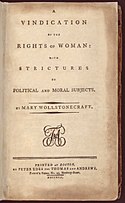
- Awadewit. When I first looked at the Mary Wollstonecraft article on Wikipedia, one of the subjects of my dissertation, it looked something like this. I was appalled! One of the first feminists! Dissertations tend to make a person think a topic is the most important thing ever, so, of course, I thought it was a travesty that Wollstonecraft's biography was reduced to this bland recitation of a few facts. I resolved to change that. It was only after I worked on the article for a while that I learned about the featured article process from Kaldari. So concerned was I that Wollstonecraft's article be of high quality, that I abstained at the FAC. Thus, I wrote the bulk of the article, but I didn't wholeheartedly support it at FAC. After working on the articles for the Mary Wollstonecraft featured topic, I revised the Wollstonecraft article, much to my relief. However, I still have a hankering to go back and revise it again. The curse of being a literature student! We rewrite endlessly.
- Cla68. I started cleaning up Naval Battle of Guadalcanal, one of the battles from World War II that most interested me, and submitted it for a peer review. I received very constructive and helpful feedback from Kirill Lokshin, then the chief coordinator for the military history project. Based on that experience, I decided to try to make that and another article as good as I could get them and submit them first for Good Article (GA) review, then later for Featured consideration. I thought that if I was going to seriously work on an article, I would want to get the article as complete and polished as possible, and the Featured criteria seemed to be a good standard to use.
- Casliber. I need to check on that, I think Hesperian got me interested in it for banksias, and it was a thrill seeing the banksia material getting mentioned in a Danish journal.[1] Also, the Wikiproject Dinosaurs collaboration. Collaborative editing is amazing as you see writers' blocks disappear in an instant. I also was dismayed at the "do not edit if you do not want to see your work edited mercilessly" and viewed Featured status as a "stable-" or "flagged revision", and to me this is its most useful role (also nice to graffiti the main page).
- How much time do you spend researching and preparing a typical Featured article for FAC?
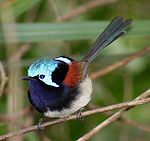
- Casliber. I generally have about half a dozen articles I am interested in in the long haul; I generally potter about in spurts and most of them tick over a few months before a final push. Biology articles are relatively easy and follow a set template, while with others such as vampire it was initially unclear what the scope of the article would cover.
- Cla68. An uncontroversial battle that has plenty of good sources giving detailed accounts of both sides doesn't take that much time to write, perhaps 10 to 20 hours, including reviewing the sources. A military controversy article often takes double that time or more to write, because the details of the incident or issue are usually so convoluted and fewer sources give a complete, clear account of exactly what happened. The average time, however, that I spend on an article that eventually makes it to FA is probably about 30 to 40 hours.
- Awadewit. It depends on the number of sources of available and the scope of the topic. For example, the number of books and articles written about Mary Shelley and her literary works is in the hundreds. To write this article, Qp10qp and I had to figure out which books and articles we had to read in order to write a comprehensive biography article. We had to be sure to include all the major points of view regarding both her life and her literary works, not an easy task. It ultimately took us about six months to research and write the Wikipedia entry. Having a collaborator was wonderful: we shared the workload and the article-writing process was exceedingly smooth. There was even a built-in peer-review! However, for an article such as The Guardian of Education, the research and writing are much quicker because there are so few sources. One can essentially read everything published on the Guardian in preparation for writing the Wikipedia article. I think I spend more time preparing articles for FAC now than I did in the past: I let articles "germinate" for several weeks and I spend more time tweaking the prose. I solicit even more peer reviews of all sorts. All told, even for articles that cover small topics, it takes weeks or months to do the necessary research and writing. (Putting out feelers for additional Jane Austen collaborators!)
- Mike Christie. I'd divide this into two parts; getting familiar with the topic, and researching a specific article. I don't think it's at all easy to write an article when you know little of the surrounding topic. Getting to know Anglo-Saxon history in enough detail that I felt I had solid ground under my feet took months, counting the first two or three featured articles as part of that time. After that it went a lot more smoothly, and I was able to write a featured article every two weeks for quite a long time, taking probably ten or twenty hours preparation for each one. The science fiction magazines were much easier because I already knew most of the information and had all the references; still, assembling those took at least ten or fifteen hours of just writing and organizing.
- How do you choose an article to bring to FAC ?
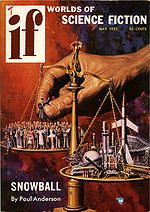
- Mike Christie. I have two different ways I choose an article. One set of articles are on a topic I know a lot about already: science fiction magazines. I have a substantial collection of old magazines, and periodically pick a title and take it to FA. The other approach came about after I read Bishop Asser's life of King Alfred the Great, in early 2007. I'd started reading about Anglo-Saxon history, but I was getting frustrated that casual reading wasn't enough for me to really retain the material. I decided that I'd update the article on Asser as a way of helping me fix the information in my head. Fairly soon I took it to FA, and realized that the process had done just what I hoped it would: I really felt I knew something about that tiny piece of history. So I began to acquire a lot more sources on Anglo-Saxon history and write more FAs in that area. I had to take a long break this summer for work-related reasons, and am now hoping to start up FA-writing in a new area—probably still history, but not Anglo-Saxon.
- Cla68. I choose subjects that are interesting and compelling to me, list them in a "to do" list on my userpage, [2] so that I can plan ahead for obtaining the necessary sources, and then work my way down the list, improving and eventually nominating each one for FA. Besides choosing topics that I find generally fascinating, I also check to make sure there are sufficient and available sources to enable the article to be taken to FA-level quality before I add it to the list.
- Casliber. As above, things I like or am interested in, and am fascinated to learn more about. All have been a journey of discovery and immensely satisfying.
- Why do you bring articles through the FAC process?
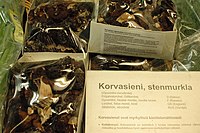
- Awadewit. Well, first and foremost because I want to be at the top of WBFAN so that I can say on my curriculum vitae that I have more featured article nominations than anyone else at the English Wikipedia. I am sure that will land me a job as a professor somewhere (joke). Seriously, though, I want not only to contribute articles of high quality but also to help raise the bar for all featured articles. When Wikipedia presents its list of "best" articles to the world, I want both the lay person and the academic to be impressed with the articles they find there.
- Cla68. Several reasons. One is that the fairly rigorous FAC process helps ensure that the article is as good as it can be. Another reason is that I believe the FA star at the top corner of the article helps give the article more credibility. Finally, after working so hard on a subject that interests you, you want people to read it, right? Featured articles have more visibility since they are listed on the featured content page and most likely will eventually be presented on the main page as "Today's featured article" or in the "On this day..." section.
- Casliber. Mainly the equivalent of a flagged or stable revision, and it does feel good to have "finished" something in a way. Am being flogged mercilessly by both the preceding on the list anyway ...
- Mike Christie. I think of it as a way to find out if I did as good a job as I hope; it's a bit like getting a paper graded. If you write an essay but never turn it in, it's easy to convince yourself you've done a good job. I feel if I can get the article through FAC, I really did achieve something.
- What has been your most difficult FAC experience?
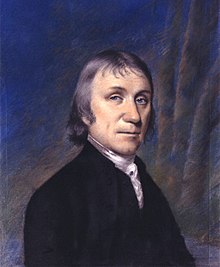
- Awadewit. Unlike many people, I have not really had contentious or difficult FACs. I have had long, drawn-out painful peer reviews, however, on the way to FAC. The most difficult featured article I have written is Joseph Priestley, a topic I knew little about before I started the article. Priestley was an eighteenth-century polymath—theologian, scientist, educator, political theorist, and minister—who also authored about 150 books. Writing a concise biography of him that explains his work in all of these fields is extremely difficult. I collected several collaborators from different fields to help me, such as ragesoss, embarrassed myself many times by my ignorance, and created what I thought was a good article. However, as this peer review demonstrated, the article was apparently unreadable. It was much too long and detailed. Ah! All of the painstaking work that I had put into the research and writing: I still had not conveyed how fascinating Priestley was! So, Scartol (the genius he is), helped me do the extremely painful work of sandboxing the article and revising it; we chopped out whole paragraphs and rewrote entire sections to remove all of the excess detail that had cluttered up the article. When it went to FAC, it received unequivocal support.
- Mike Christie. I haven't really had any bad or difficult experiences at FAC. Æthelbald of Mercia was perhaps the hardest to get through, just because it was the first Anglo-Saxon king I nominated, and I knew much less about the period back then. However, I got very positive and helpful comments from several FAC regulars, and qp10qp, in particular, provided a very detailed review that led to a substantially improved article. It was hard work, and difficult in that sense, but tremendously enjoyable.
- Cla68. Ehime Maru and USS Greeneville collision and 1994 Black Hawk shootdown incident were difficult to write, because the important details were scattered among many different sources. The effort to identify the most pertinent details and write articles that hopefully presented a clear picture of what took place without giving too much detail was frustrating at times.
- Casliber. We had to carve a great chunk of vampire off, which I was somewhat unhappy about as I felt it stood well as a well-rounded work. Failing one is never fun either, as I did with Stegosaurus first time round.
- Which of the featured articles to which you've contributed make you most proud? And why?
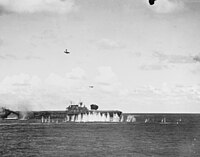
- Cla68. Several. Naval Battle of Guadalcanal, because it was one of the first articles I nominated and has been mentioned in outside media. [3] Battle of the Santa Cruz Islands, because I was fortunate to find some good images that I think complement the text extremely well and really help effectively tell that story. Finally, I'm very proud of Ehime Maru and USS Greeneville collision because I have some strong personal feelings about that incident and I'm hopeful that that article accurately and completely tells that story.
- Casliber. Vampire and lion, both really central topics or ideas which I figure many people will read. Similarly Common Raven as well for an iconic bird. I like adding the cultural significance of lions and ravens too. With vampire it was trying to provide a more sophisticated view of why people believed in vampires and the input of pathology and medical lore into the genesis of the belief, rather than just a list of vampires and vampire attributes. Also noting the evolution of the literary/film vampire from the folkloric one, which was not as disparate as I first thought once I looked at the sources closely. Schizophrenia was a big save at FAR and I feel a good job was done, and noting how many folks look at it every day. The whole coordination of WikProjects Birds and Dinosaurs has been great, and the sheer mass of FAs and GAs produced. I have been honoured in being a catalyst there.
- Mike Christie. Æthelberht of Kent is one I'm proud of. There were some difficult parts to get right, including a very complex and confused chronology. For such an early king there is also a lot to say, and it was a pleasant challenge putting it all together. Offa of Mercia is probably the best known Anglo-Saxon king, so I feel that that one will get more readers than most. From the magazines, Amazing Stories is probably the best one; it's important within the history of science fiction, which made it satisfying when it became featured.
- Awadewit: Actually, I am most proud of the smaller contributions I have made to featured articles at various points during the review process. Since I research and write about literary figures in "real life", there is nothing spectacular in doing that for Wikipedia, but I have found my small efforts to make scientific articles such as introduction to general relativity, archaea, introduction to viruses, and introduction to evolution, more accessible to be deeply satisfying. Working with the science editors on these articles to find language that was both accurate and comprehensible to the lay person was a challenge that I found immensely rewarding.
- What advice do you have about the FA process for other writers?
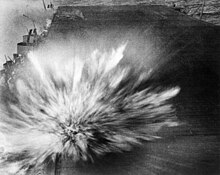
- Cla68. I think it's very important for others to review what you have written and provide feedback or help improve on it with some helpful edits. It is very easy, at least for me, to miss typos and formatting errors which a second set of eyes will probably see. Also, another editor may provide a better way of saying or phrasing something in the article. One of the biggest mistakes that a few editors make is being combative with the FA reviewers. Fighting or arguing with the FAC reviewers is extremely counterproductive.
- Awadewit. Be patient. It is better to spend an extra week or two waiting for a copyeditor before FAC than to have to rush around and find one during the FAC. It is better to spend the time working through an additional peer review that will work out the kinks in the article before FAC than toiling through a list of them at FAC. It is better to know the basics of the MOS than to be blindsided by a list of "MOS violations" at FAC. Try to anticipate all of these issues ahead of time. Your meticulous attention to detail will be noticed and appreciated. (Oh, and review an article or two! We need help reviewing!)
- Casliber. If you go into one not satisfied with the article yourself, it will likely fail, as your hunch is often right. It is funny when you write some that some just come together so much more easily than others and you can be at a loss to figure out why. I can be lazy at times, which is a lethal error at FAC, never cross your fingers hoping reviewers won't pick up on something you feel uneasy about – they will and you will have to frantically try and fix with a time limit. Much less fun.
- Mike Christie. I agree with Cla68; if you deal politely with FAC reviewers you can usually get a lot of good from their comments, even ones you don't agree with, but if you are less than polite it can make things very difficult indeed.
- Do you think reviewing other articles at FAC helps you as you write and nominate articles yourself? If so, how?
- Mike Christie. It helps a little, in that thinking hard about how to find and fix problems in prose and organization in other people's writing will probably improve your own skills. However, I might reverse the way the question puts it: being a writer of featured articles helps you to be a good reviewer more than being a reviewer of FAs helps you write them.
- Awadewit. Yes, in that I can keep a "pulse" on what reviewers are expecting and, to some extent, I can shape those expectations myself. For example, every FAC goes through a source check and an image check now. Since I review quite frequently, I know that such checks are standard and I know what to expect from them and how to handle them (especially since I do many of the image checks myself!). I would also agree with Mike, however, that writers of featured articles make good reviewers. They can often offer solutions to help nominators. Since I have written a few author biographies, I know several different article structures that work for those articles and can discuss the benefits and drawbacks of each one.
- Have you had any difficulty maintaining the Featured articles you contributed to?
- Mike Christie. Apart from occasional vandalism, mostly when an article is on the main page, it hasn't been bad at all. Every now and then you get a pleasant surprise, in fact; right now a brand new editor has left some interesting new information on the talk page of Ælle of Sussex, and I hope we'll be incorporating that into the article soon. Few of my articles have a lot of traffic, so that's helpful; I can only imagine what it would be like to try to maintain William Shakespeare, which is featured, or Jane Austen, which I know Awadewit is working on.
- Casliber. High traffic articles such as lion, schizophrenia, and vampire are always challenging – watching the erosion over time is interesting. This is where the "flagged revision" idea comes in helpful, as one can compare the current with the promoted version and try and forge a best-possible version sometime down the track (hopefully before a dreaded Featured article review). I agree with Mike that the quiet ones are pretty easy, and useful improvements do happen now and again.
- Has your Wikipedia article writing had any interesting impact or effect in your personal or professional life?
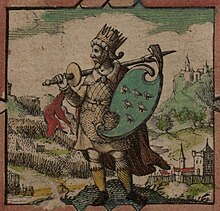
- Mike Christie. When Anglo-Saxon Chronicle appeared on the main page, I made the mistake of mentioning it to the friend who'd hired me at my new job. He told others in the company, and one of them found, on my user page, a link to a portrait of me painted by a friend of mine.[4] That promptly got printed out, blown up to six foot by four foot, and taped to the wall behind my desk! Quite a surprise when I came back to my desk from a meeting that morning.
- Awadewit. My "coolness factor" as a teacher has risen. I frequently use Wikipedia as a teaching tool in an effort to explain what a reliable web source is and to teach basic copyediting skills. While discussing these rather mundane topics, I often tell little Wikipedia stories. That I write Wikipedia articles is apparently "awesome". I also dramatically rose in my students' estimation when Mary Shelley appeared on the main page on 30 October 2008.
- Cla68. I used to spend a lot of my free time playing computer games. Now, I use much of that time to research for and write Wikipedia articles. I hope that the articles I've helped build are of some benefit to those that read them. Working on Pacific War articles has also led me to consider writing a book sometime in the future on a Pacific War battle that doesn't currently have much written about it in English which utilized Japanese sources. We'll see.
- Casliber. My writing has improved dramatically, and ability to copyedit others. Also find myself reading material and adding it to pages often. My other half is less than impressed though ....

Discuss this story
Awadewit, where you encourage others to review articles, would you be interested in linking Wikipedia:Wikipedia Signpost/2008-04-07/Dispatches? SandyGeorgia (Talk) 07:09, 17 November 2008 (UTC)[reply]
Cas, do you have that link for the Danish journal article ?? SandyGeorgia (Talk) 18:36, 17 November 2008 (UTC)[reply]
Images
If each one of you will list a few of your favorite images from your FAs here (make sure they're free images), we can see how many fit and give us the best layout once all the text is in. SandyGeorgia (Talk) 07:26, 17 November 2008 (UTC)[reply]
Bummer we can't include Mike's portrait! Awadewit (talk) 22:44, 17 November 2008 (UTC)[reply]
Mike's images:
Combine questions/answers?
Do you think some of the question/answer sections could be combined? Awadewit (talk) 02:55, 18 November 2008 (UTC)[reply]
I got busy and won't be able to get back to this until tomorrow or the next day, will look at combining those, but there's one aspect of all four responses that is troubling me. The impression may be left on FAC newcomers that 20 hours is the outside limit for writing an FA. I spent ten years researching and gathering material for Tourette syndrome, and six months writing it (granted, I was a newbie, and figuring out the ins and outs of Wiki, and there was, back then, not a single other Wiki editor who could help me either with the medical material or the ins and outs of medical FAs, WP:MEDMOS and WP:MEDRS have been substantially beefed up since I was new, and TS led the way in setting a higher standard for articles like Asperger syndrome, Schizophrenia and autism, which were dreadful FAs before standards improved, but all I had for comparison). Colin and I have discussed FAing History of Tourette syndrome (many interesting sources available), and that would take me at about four months of research and work. Can any one of the four you add any similar experience, something to dispel that idea that a new writer could turn out an FA with a few hours work? SandyGeorgia (Talk) 20:25, 22 November 2008 (UTC)[reply]
Combinations
Potter and putter
I'm sure Casliber will respond if he notices David Fuchs' recent edit summary, but just FYI: "potter" is a legitimate word in British (and apparently Australian) English. Its meaning is close to that of "putter". Mike Christie (talk) 00:38, 23 November 2008 (UTC)[reply]
Best Signpost article